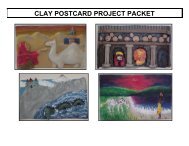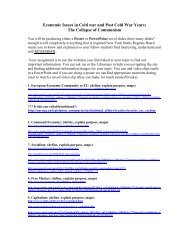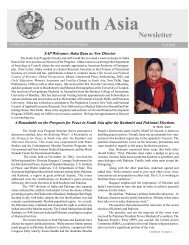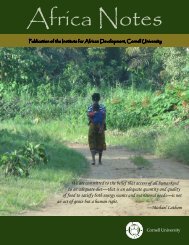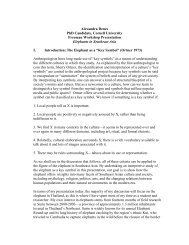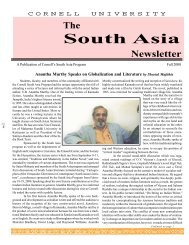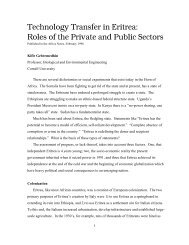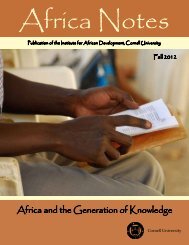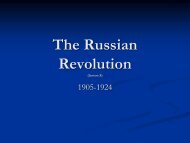Spring 2004 - South Asia Program - Cornell University
Spring 2004 - South Asia Program - Cornell University
Spring 2004 - South Asia Program - Cornell University
You also want an ePaper? Increase the reach of your titles
YUMPU automatically turns print PDFs into web optimized ePapers that Google loves.
<strong>South</strong> <strong>Asia</strong><br />
Newsletter<br />
A Publication of the <strong>South</strong> <strong>Asia</strong> <strong>Program</strong>, <strong>Cornell</strong> <strong>University</strong><br />
A Publication of <strong>Cornell</strong> <strong>University</strong>'s <strong>South</strong> <strong>Asia</strong> <strong>Program</strong><br />
Saying Goodbye after 37 Years of Dedicated Service<br />
On December 4, 2003, friends, colleagues and well-wishers<br />
gathered to bid Ved Kayasta, Librarian in charge of <strong>Asia</strong> and<br />
<strong>South</strong> <strong>Asia</strong> section of the <strong>Cornell</strong> <strong>University</strong> Library, a happy and<br />
long retirement after thirty-seven years of dedicated service. Ved<br />
was honored by colleagues and faculty in remembrance speeches.<br />
Most of us don't know what life at <strong>Cornell</strong> without Ved is like.<br />
There were plenty of tissues passed around and misty eyes as<br />
attendees at the retirement reception remembered Ved's huge contribution<br />
and dedication to the library. Professor<br />
Kenneth A. R. Kennedy remembered how helpful<br />
Ved had been,<br />
when he depended<br />
on<br />
“the magnificent<br />
<strong>South</strong><br />
<strong>Asia</strong> collections<br />
in<br />
<strong>Cornell</strong>’s library<br />
system,”<br />
which Ved kept<br />
up-to-date,<br />
finding titles for<br />
Professor Kennedy, and acquiring<br />
those needed when<br />
the source was not yet part<br />
of the library’s collection.<br />
He also remembered how<br />
Ved surprisingly appeared<br />
in New Delhi, where Professor<br />
Kennedy was giving a<br />
talk, having gotten wind of this lecture. Others remember Ved fondly<br />
as taking over the whole <strong>Asia</strong> collection, which included the Middle<br />
Eastern section, when there were no others who were available to<br />
tackle such a job.<br />
People spoke of Ved’s dedication, not only to the faculty,<br />
but to the students as well. He was Faculty Advisor for a number of<br />
student organizations through the years, such as Bhakti, and the<br />
Hindu Student Council. Ved would open up his home to visiting<br />
researchers, faculty and graduate students who needed a temporary<br />
residence, treating them all like family members. Lisa LeFever,<br />
Ved's devoted assistant of ten years, remembers that, "He was genuinely<br />
concerned for students and myself. It was not unusual for a<br />
student to drop by looking for 'Ved Uncle'." Lisa also remembers<br />
being a bit intimidated by him at first, as she had never worked for<br />
anyone from another country, but as time went by, she discovered<br />
someone who was "a pleasure to work for." She recalls that at any<br />
given time, she could be treated to an impromptu lecture on various<br />
<strong>Spring</strong> <strong>2004</strong><br />
topics, which opened her eyes to <strong>South</strong> <strong>Asia</strong>. She recalls, "His<br />
knowledge and experience made the office an interesting place,<br />
often he would bring a book to me and tell me all about the author,<br />
i.e. he was a sibling's friend, etc." She adds, "During the ten years<br />
I have worked for Ved, I found him most generous and understanding.<br />
I count it as a privilege having worked for him."<br />
After attending Panjab <strong>University</strong> in Chandigarh, Ved<br />
went on to earn his B.A. in 1955 at Banaras Hindu <strong>University</strong>,<br />
where he also earned an M.A. in Geography in 1958 and a Diploma<br />
in 1960 in Library<br />
Science. He then<br />
earned another<br />
Master’s degree in<br />
1963, from Syracuse<br />
<strong>University</strong>, in Library<br />
Science. He has<br />
worked as a<br />
cataloger at Panjab<br />
<strong>University</strong> Library in<br />
Chandigarh, parttime<br />
assistant at<br />
Syracuse <strong>University</strong><br />
Library, and as a<br />
Professional<br />
Librarian of the<br />
Oriental Collection<br />
Photos by Valerie Jacoski and Rare Book<br />
Collection at<br />
Cleveland Public Library in Ohio. He first came to <strong>Cornell</strong> in<br />
1966 as an Assistant Librarian, and quickly climbed the ranks<br />
to Librarian in 1976. In 1994 he was appointed as the first Ernest L.<br />
Stern ‘56 <strong>Asia</strong> Curator, which is an endowed chair.<br />
Ved was a loyal friend to the <strong>South</strong> <strong>Asia</strong> <strong>Program</strong>,<br />
attending SAP's Brown Bag Seminar Series on Monday afternoons<br />
regularly. He was always active in the question and answer section<br />
at the end of the lectures, which often stimulated more questions<br />
and debate. Although his office was in the Olin Library Building,<br />
he'd occasionally come by to have a chat during lunch break, or a<br />
cup of his favorite Earl Grey tea, sometimes bringing contributions<br />
to our own video library. He was a great lover of cinema, and kept<br />
us up-to-date on the latest <strong>South</strong> <strong>Asia</strong>n films. He did wonders at<br />
developing the <strong>South</strong> <strong>Asia</strong> visual collection at the Kroch Library,<br />
which now offers over 1,000 <strong>South</strong> <strong>Asia</strong>-related videos and DVD's<br />
of both feature films and documentaries ranging from politics to<br />
culture and the performing arts. In addition to this, it is estimated<br />
that Ved is responsible for over 5,000 book acquisitions since he<br />
first came to <strong>Cornell</strong> thirty-seven years ago.
NOTES FROM THE DIRECTOR<br />
Dear Friends and Colleagues of the <strong>South</strong> <strong>Asia</strong> <strong>Program</strong>,<br />
It is already the middle of another semester and at last it appears that spring is here in more than a definition. But, I am not<br />
complaining about the delayed sunshine because the heart of the <strong>South</strong> <strong>Asia</strong> <strong>Program</strong> has been warmed by such a large number of<br />
activities and events in recent months. In particular, this has been a remarkably productive time for the various – old and new – students<br />
and student groups associated with the <strong>Program</strong>. So I want to use this issue of the newsletter to tell them how much we depend on them<br />
and on their enthusiasm for and participation in the life of the <strong>Program</strong>.<br />
While many of these individual activities find separate mention in other parts of this newsletter, I want to use my space here<br />
to personally thank:<br />
1) Jason Cons, Karuna Morarji, Nosheen Ali, Sara Shneiderman, Jessica Falcone, Farhana Ibrahim and Shital Pravinchandra for<br />
thinking up and organizing the hugely successful Graduate Student Conference on <strong>South</strong> <strong>Asia</strong>. We all look forward to this<br />
becoming an annual event, even if I am not sure that the students themselves are keen to repeat this energy-intensive experience.<br />
2) Sara Shneiderman, Iftikar Dadi (no longer a student, but still) and Farhana Ibrahim for giving such interesting talks at our<br />
Monday seminar series. Together with the seminars by <strong>Cornell</strong> faculty (by Ron Herring, Mukul Majumdar, Mahesh Rangarajan and<br />
Shaker Ahmed) these helped us continue to mine the in-house talent that seems to so easily make up for the uncertainties with<br />
getting outside visitors in the winter months.<br />
3) Keyzom Ngodup, Suhair Khan and Natasha Qamar for beginning a new group on campus, <strong>South</strong> <strong>Asia</strong>n Women (SAW), that will<br />
try to illuminate and celebrate the diversity and strengths of <strong>South</strong> <strong>Asia</strong>n women at <strong>Cornell</strong> and worldwide. They inaugurated their<br />
existence by inviting Yasmine Kabir, the well known documentary filmmaker from Bangladesh, to show and discuss her latest film<br />
“A Certain Liberation”. This was an extremely successful event that owed its success to a remarkable film, and not just to the<br />
samosas and pakodas that the audience was plied with. If SAW can keep up this standard of activity, it will be doing a great favor<br />
to the <strong>Cornell</strong> community. It is even more gratifying that the founders of SAW are all undergraduates.<br />
4) Karuna Morarji, Nosheen Ali and Farhana Ibrahim for reviving SAAPAA, the <strong>South</strong> <strong>Asia</strong>n Association for Political and<br />
Academic Awareness . Once the campus voice of conscience for <strong>South</strong> <strong>Asia</strong>n affairs, I am extremely pleased that SAAPAA plans<br />
to throw itself once more into fostering a critical engagement with <strong>South</strong> <strong>Asia</strong> as well as with issues of labor, race, gender and<br />
sexuality in general as they pertain to the <strong>South</strong> <strong>Asia</strong>n community. This semester SAAPAA was involved in organizing the<br />
Graduate Students’ Conference as well as the Yasmine Kabir film showing.<br />
5) Arshiya Lokhandwala for doing something quite different. In March, she curated an exhibition of women’s video art from India,<br />
called Rites/Rights/Rewrites and organized a panel discussion around the theme of “Rethinking Video”.<br />
6) The members of ASHA for keeping up the tradition of their wildly popular dinners to raise money for projects in India and the<br />
members of SPICMACAY for treating us to a heart-thumping tabla recital by Anuradha Pal, one of the few female experts on a<br />
traditional male instrument.<br />
7) And finally, the various student associations and cultural organizations connected with <strong>South</strong> <strong>Asia</strong> on campus. Through their<br />
dance and music and celebration of some of the numerous rites and festivals of the <strong>South</strong> <strong>Asia</strong>n region, they raised the temperatures<br />
on campus even as the autumn ended too soon and the winter too late.<br />
I believe one of the highlights of the season has been the late night<br />
broadcasts of the India-Pakistan cricket matches being currently played<br />
in Pakistan. This positive example of “friendly fire” has raised such<br />
hopes for regional peace that the excitement has drenched even those<br />
of us so far away from the action.<br />
Since this is a note dedicated to the students at <strong>Cornell</strong>, let me<br />
close by wishing them all the luck that they need to end the semester with<br />
miraculously successful exams and unduly happy summers.<br />
Sincerely,<br />
The Brides Toilet by Amrita Sher Gill<br />
2<br />
Alaka Basu
VISITORS<br />
A Scholar-Practitioner Speaks: The Honorable Thomas W. Simons, Jr.<br />
at the <strong>South</strong> <strong>Asia</strong> <strong>Program</strong>'s Seminar Series<br />
by Karthika Sasikumar<br />
At a time when India-Pakistan negotiations are spurring hopes of peace in the<br />
region, the <strong>South</strong> <strong>Asia</strong> <strong>Program</strong> was fortunate to host a talk by Thomas W. Simons, Jr.<br />
Simons, a former Ambassador to Pakistan and a professor of international politics at several<br />
distinguished institutions is the Provost’s Visiting Professor at <strong>Cornell</strong> this spring. He also<br />
spoke at the Peace Studies <strong>Program</strong> and gave a public lecture on Islam at the <strong>University</strong>.<br />
In his talk for the <strong>South</strong> <strong>Asia</strong> <strong>Program</strong> on 23 February <strong>2004</strong>, Simons drew upon his experience<br />
as Ambassador to Pakistan in the crucial 1996-1998 period. Taking the current peace negotiations<br />
as his starting point, he traced their connection to developments in the subcontinent over the<br />
last fifty years. While Simons believes that the security problematic in <strong>South</strong> <strong>Asia</strong> is structural in<br />
that it stems from the huge power imbalance between India and Pakistan, he holds that domestic<br />
politics are equally important in explaining outcomes.<br />
Therefore, he spent a considerable amount of time discussing the growing disenchantment<br />
in Pakistan with radical Islamism. In a Pakistan that has seen the disintegration of its neighbor<br />
under the Taliban regime and that has itself experienced the divisiveness of religious politics, the<br />
two assassination attempts on President Musharraf in December, 2003, strengthened the moderate voices advocating dialogue with<br />
India. Simons sees reasons for hope in India as well. The BJP government hopes to reap a ‘peace dividend’ in the forthcoming elections<br />
through a peaceful settlement with Pakistan spearheaded by Prime MinisterVajpayee.<br />
Simons admitted that radical Islamism had penetrated into the body politic, a process that is hard to reverse. However, he drew<br />
on the analogy with the US-Soviet Cold War relationship to claim that parties need not compromise on their declared ideology to enter<br />
into pragmatic risk-reduction arrangements. Answering a question from Kaushik Basu, he also pointed out that sustained and<br />
comprehensive India-Pakistan interaction would lower the risks of a war triggered by an ‘out-of-control’ faction. On the US role in the<br />
region, Simons believes that the US is now applying the lessons of the past. It is more enthusiastic about democracy in Pakistan, even<br />
if that means the ascendance of moderate Islamic parties. It seeks to engage both parties in a broader relationship in order to avoid the<br />
type of dangerous escalation in which the US role creates perverse incentives for brinksmanship.<br />
This was a talk that could only have been given by a senior statesman who has spent a lifetime applying his personal experience<br />
to current theoretical debates in political science.<br />
Karthika Sasikumar is a Ph.D. candidate in the Department of Government.<br />
SAP Hosts Fulbright Scholar from Bangladesh<br />
The <strong>South</strong> <strong>Asia</strong> <strong>Program</strong> welcomes Fulbright Scholar, Dr.<br />
Shaker Ahmed, who will be in residence at the <strong>Program</strong> from January<br />
to June, <strong>2004</strong>. Ahmed obtained his<br />
Ph.D. in Economics from the Institute of<br />
National Economy in Moscow in 1981.<br />
Prior to that, he obtained an M.S. in Economics<br />
with a Specialization in Industrial<br />
Planning from the Institute of National<br />
Economy, Odessa, Ukraine in 1977. He has<br />
an undergraduate degree from Dhaka College<br />
and is currently a Professor of Economics<br />
at Dhaka <strong>University</strong>.<br />
On April 19, as part of SAP’s<br />
Seminar Series, Ahmed gave a lecture entitled<br />
Cross Border Energy Trade in <strong>South</strong><br />
<strong>Asia</strong>, where he elaborated on the natural resource supplies and<br />
energy consumption throughout <strong>South</strong> <strong>Asia</strong> in a demographic<br />
presentation. He gave several solutions to the sharing of natural<br />
resources between the <strong>South</strong> <strong>Asia</strong>n countries, and political reasons<br />
as to why the obvious doesn’t always work. He suggests<br />
closer cooperation between countries within SAARC (<strong>South</strong> <strong>Asia</strong>n<br />
Association for Regional Cooperation), including between India<br />
and Pakistan. There is also immense potential for developing <strong>South</strong><br />
<strong>Asia</strong> as a market for natural gas from<br />
Myanmar. He surprised the audience with<br />
the fact that only 30 percent of Bangladeshi<br />
households have electricity. He also gave<br />
statistics of the carbon monoxide waste in<br />
metric tons generated by each individual<br />
country, which, as in the case of India, is a<br />
staggeringly huge number.<br />
While Shaker's previous research involved<br />
the topic of trade and poverty, the<br />
energy area is a new field of study for him.<br />
He emphasizes energy trade as an important<br />
factor in helping to mobilize <strong>South</strong> <strong>Asia</strong>. He<br />
is here at <strong>Cornell</strong> collecting data on this topic for an upcoming<br />
book, as he states that <strong>Cornell</strong>’s abundant libraries and easily available<br />
internet access offers resources he could not get in Bangladesh,<br />
due to breakdowns in their telecommunications system.<br />
Shaker is in Ithaca accompanied by his wife Heera and<br />
13-year-old son, Fahraj.<br />
3
LIBRARY<br />
SAP Welcomes New <strong>South</strong> <strong>Asia</strong> Collections Librarian, Adnan Malik<br />
The <strong>South</strong> <strong>Asia</strong> <strong>Program</strong>’s faculty and staff would like to extend a warm welcome to Adnan<br />
Malik, who will be the successor to Librarian, Ved Kayasta, in charge of the <strong>South</strong><br />
<strong>Asia</strong> Collection at the Kroch Library. Adnan came from Pakistan to the United States an<br />
engineering student. As an undergraduate he attended Ohio Wesleyan <strong>University</strong>, which is a<br />
small liberal arts institution. After taking courses in sociology and anthropology, he decided to<br />
change his major from science to the humanities, and graduated with a B.A. in sociology. While<br />
pursuing a Ph.D. in sociology at the <strong>University</strong> of Chicago, Adnan took a position to supplement<br />
his funding, and by chance was hired at the <strong>South</strong> <strong>Asia</strong> Department of the Regenstein Library<br />
at the <strong>University</strong> of Chicago’s main library. His familiarity with a number of <strong>South</strong> <strong>Asia</strong>n<br />
languages and scripts was a big asset. He started working on the <strong>South</strong> <strong>Asia</strong> Microfilm Project<br />
and researched and made records for several India Office catalogues in different languages.<br />
After that, he processed the Regenstein Library’s own huge backlog of <strong>South</strong> <strong>Asia</strong>n monographs.<br />
He states, “…that is how I was sucked into the strange world of libraries and cataloging. I found it interesting enough that I decided to<br />
make it my career and started applying for jobs, and here I am…”<br />
Adnan hopes to contribute to the growth of the <strong>South</strong> <strong>Asia</strong> Collection by enhancing its strengths, and also building on its<br />
less-developed areas. He finds it impressive that, unlike many other <strong>South</strong> <strong>Asia</strong>n libraries, the Kroch's <strong>South</strong> <strong>Asia</strong> Collection has<br />
many resources on Sri Lanka and Nepal, whereas other univeristies' libraries are more focused on India. We look forward to working<br />
with Adnan and encourage students and faculty to drop by the Kroch Library to meet him.<br />
4<br />
Library’s <strong>South</strong> <strong>Asia</strong> Collection Receives Gift of Slide Collection<br />
Indian architectural elements from the Maurya period;<br />
one of a collection of more than 3,700 slides of Indian<br />
and <strong>South</strong>east <strong>Asia</strong>n art and architecture that was given<br />
to <strong>Cornell</strong> Library’s <strong>South</strong> <strong>Asia</strong> Collection by C. K.<br />
Gairola, who assembled the collection during his travels.<br />
by Elizabeth Fontana<br />
A valuable collection of more than 3,700 slides of Indian and <strong>South</strong>east<br />
<strong>Asia</strong>n art has been added to <strong>Cornell</strong> <strong>University</strong> Library’s renowned <strong>South</strong> <strong>Asia</strong><br />
Collection. The collection was given to <strong>Cornell</strong> by C. Krishna Gairola, a retired<br />
professor of Indian history and archaeology who assembled the collection during<br />
his travels as a student and later, professor, in various parts of <strong>South</strong> and <strong>South</strong> East<br />
<strong>Asia</strong>.<br />
The Gairola Slide Collection is a unique set of images that includes a significant<br />
representation of Indian art and architecture from the dynastic periods through the<br />
early 1960s, as well as art from Cambodia, Burma, Thailand, and Indonesia. The<br />
variety of subject matter should prove useful to students and scholars of <strong>South</strong><br />
<strong>Asia</strong>n architecture, art, anthropology, and history. The images, photographed by<br />
Dr. Gairola himself between 1950 and 2000, offer a perspective that differs from that<br />
of official or commercial photographs of Indian art works and historical sites.<br />
C. K. Gairola was born in Dehra Dun, India. He received an M.A. in history from the<br />
<strong>University</strong> of Allahabad, India in 1946 and a Ph.D. in Indian history and archaeology<br />
from the <strong>University</strong> of London in 1949. He studied art history and completed a<br />
Diplome de l’Ecole at the School of the Lourvre, Paris, in 1953. After working for the<br />
Embassy of India and the Indian Foreign Service in Switzerland and New Delhi, he accepted a position as professor and department head<br />
at the M.S. <strong>University</strong> of Baroda, India in 1962. Dr. Gairola also worked as a journalist for the Hindustan Times and Week End Review in<br />
New Delhi before immigrating to the United States in 1967.<br />
In the U.S., Dr. Gairola held professorships at Kansas State <strong>University</strong>, the <strong>University</strong> of Washington (Seattle), and Virginia<br />
Commonwealth <strong>University</strong> before retiring in 1987. Among the many honors he received was the Alexander von Humboldt Fellowship,<br />
awarded by the German government, as well as fellowships from the French government and the Smithsonian Institution. Dr. Gairola died<br />
in July 2003.<br />
The Gairola Slide Collection was acquired through the efforts of Ved P. Kayastha, the retired <strong>South</strong> <strong>Asia</strong> Curator. This slide<br />
collection combined with the Robert MacDougal Slide Collection (which focuses mostly on religious sites in <strong>South</strong> <strong>Asia</strong>) will create one<br />
of the most outstanding slide collection on <strong>South</strong> <strong>Asia</strong> in the United States.<br />
For more information, contact Adnan Malik, curator of <strong>Cornell</strong> Library’s <strong>South</strong> <strong>Asia</strong> Collection, phone: 607-255-9479 or email<br />
asm48@cornell.edu.
CONFERENCES<br />
Recent <strong>Cornell</strong> Graduate Gives Paper in Sri Lanka<br />
Cynthia Caron, postdoctoral associate of the Polson Institute for Global Development,<br />
and recent Ph.D. graduate from <strong>Cornell</strong> in Development Sociology, presented a<br />
paper entitled, “Repatriation and Resettlement: Internally-Displaced Person (IDP) & Host<br />
Community Perceptions” at a workshop sponsored by The American Institute of Lankan<br />
Studies in Colombo on Muslims in Sri Lanka: Social, Political, and Cultural Issues. Dr.<br />
Dennis McGilvray (also pictured), Anthropology Department at UC Boulder, organized<br />
the July, 2003, workshop. Cindy’s research is sponsored by the John D. and Catherine T.<br />
MacArthur Foundation's <strong>Program</strong> on Global Security and Sustainability. Her research,<br />
which began in June, 2003, has focused on relations between Muslims who were expelled<br />
from Sri Lanka's northern province in October, 1990, and the multi-ethnic community they<br />
have been living with since the time of their displacement. She has been collecting oral histories about the day of expulsion from youth<br />
as well as documenting the experience of young persons as well as the second-generation which was born and has grown up in<br />
government-operated welfare centers and relocated villages. The second phase of her research, which will begin in May, <strong>2004</strong>, will be<br />
based in Mannar district, one of the places from which Muslims were expelled. With the signing of the cease-fire agreement between<br />
the Government of Sri Lanka and the Liberation Tigers of Tamil Eelam in February, 2002, internally-displaced persons (IDPs) are slowly<br />
returning to their places of origin. The second phase of research will focus on return migration, pluralism, and social integration.<br />
reminiscing about the World Social Forum (WSF), <strong>2004</strong> ....<br />
by Nosheen Ali<br />
at 4:00 p.m. on jan 16 th , the official starting time of the WSF, i was stuck at the VT<br />
police thana where Pakistani citizens are required to report within 24 hours of their entry<br />
into Mumbai. the officer hastened his ritualistic inquiries when i told him that the WSF –<br />
my reason for being in Mumbai – had already started. of course, i was quite sure that like<br />
all desi events, the WSF would run way behind schedule. imagine my shock when a friend<br />
called and asked me to hurry up as the forum, indeed, had started almost on time! the<br />
surprise had only begun.<br />
i knew a lot of people were going to be at the NESCO grounds in goregaon, the<br />
venue for the WSF, but 100,000, and that too from more than 120 countries, was way<br />
A protest for tribal rights at the WSF<br />
beyond my expectations. even more heartening was the fact that this massive crowd<br />
seemed to be dominated not by NGO-types as i had expected, but by groups such as the adhivasis (tribals) from Jharkhand, dalits<br />
(untouchables) from Maharashtra, and mahila mandals (women organizations) from Gujarat. you could not walk two steps without<br />
encountering a new group representing and advocating a different cause through placards, pamphlets, street theatre, impromptu dance,<br />
folk music and slogan-chanting processions. meanwhile, the various halls and tents were hosting seminars, panel discussions, workshops,<br />
film screenings and art exhibitions that dealt with every imaginable political, economic and socio-cultural issue. all this with great chai<br />
and food all around!<br />
of course, there were plenty of frustrating moments as well in the thrilling chaos of the WSF: when the opening plenary (with<br />
such celebrities as writer/activist Arundhati Roy and Nobel Peace Prize winner Shirin Abadi) was full of lackluster speeches, when i felt<br />
that “key panels” with big names were not just a thing of the plenary session but came to dominate the entire forum, when panels that<br />
i had gotten up at 8:00 a.m for after sleeping for four hours got cancelled, when it was impossible to decide which events to attend as there<br />
were tons of them happening simultaneously, and when, the famous dancer Malika Sarabai, emcee for the WSF, standing on Stage Faiz<br />
which was named after the brilliant Pakistani poet Faiz Ahmed Faiz, kept pronouncing his name as “Fayyaz”!!!.<br />
but there were larger issues with the WSF – the lack of democratic decision-making in the organization of the WSF, the lack of<br />
concrete proposals for change, and problematic sources of funding, to name just a few. “another world is possible” was the official<br />
slogan of the WSF, but i’m not sure what “world” the WSF hoped to claim to create, and what kind of change came out of WSF activities.<br />
it was encouraging, though, that there were spaces for critique both within the WSF – for instance, in panels organized specifically to<br />
discuss the politics of the WSF – as well as outside of it in the form of the “Mumbai Resistance <strong>2004</strong>”. also encouraging was the fact that<br />
according to many participants, the WSF in India was much more diverse, and much better organized than the one in Brazil the year<br />
before.<br />
well, i’m not sure if the previous and future WSFs will make another world possible, but at least at the forum in Mumbai itself,<br />
amidst thousands of people from all over the world struggling for constructive change, and amidst the inspiring performances on the<br />
streets and informative deliberations in the tents, it really did feel like i was in another world ☺<br />
Nosheen Ali, a Ph.D. candidate in the Department of Sociology at <strong>Cornell</strong> Univeristy, prefers her own system of letter<br />
capitalization.<br />
5
6<br />
<strong>Cornell</strong> <strong>South</strong> <strong>Asia</strong> <strong>Program</strong> Hosts First Graduate Conference on <strong>South</strong> <strong>Asia</strong><br />
The first<br />
annual <strong>Cornell</strong><br />
<strong>University</strong> Graduate<br />
Conference on <strong>South</strong><br />
<strong>Asia</strong> was held this<br />
March 12 th and 13 th .<br />
Presenters from<br />
universities around<br />
the country—from<br />
Alaka Basu gives welcome speech, while panel<br />
member, Jason Cons looks on<br />
the <strong>University</strong> of<br />
Washington and<br />
Stanford to Columbia and the <strong>University</strong> of Syracuse, as well as six<br />
presenters from <strong>Cornell</strong>—representing broad ranges of<br />
disciplines—from Political Science to Comparative Literature—came<br />
to deliver papers, receive feedback on work in progress, meet new<br />
people in the field, and eat some delicious food.<br />
The conference, which was entirely student<br />
organized, was conceived in the spring of 2003<br />
as a way of both pulling graduate students<br />
interested in <strong>South</strong> <strong>Asia</strong> at <strong>Cornell</strong> together<br />
and of getting to know people in other<br />
universities conducting or preparing to<br />
conduct new and exciting work in/on <strong>South</strong><br />
<strong>Asia</strong>.<br />
Originally planned as a one-day<br />
conference with 10-12 papers, the organizing<br />
committee—consisting of Nosheen Ali<br />
(Development Sociology), Jason Cons<br />
(Development Sociology), Jessica Falcone<br />
(Anthropology), Farhana Ibrahim<br />
(Anthropology), Karuna Morarji (Development<br />
Sociology), Shital Pravinchandra (Comparative Literature), and Sara<br />
Shneiderman (Anthropology)—structured a call for papers that,<br />
instead of focusing on one specific topic, called for submissions<br />
across four themes that we felt were critical in contemporary<br />
research on <strong>South</strong> <strong>Asia</strong>: violence, environments, borders, and<br />
historiography/methodology. The response was overwhelming. We<br />
received 45 excellent proposals, far more than we had originally<br />
expected, and decided to expand the conference to a two-day event,<br />
inviting 24 presenters (20 of which eventually presented) to sit on<br />
five panels.<br />
The keynote address for the conference was delivered by<br />
Amita Baviskar, a sociologist currently at <strong>University</strong> of California,<br />
Berkeley, and a graduate of <strong>Cornell</strong>’s Development Sociology<br />
program. Prof. Baviskar delivered a talk titled “Environmental<br />
Identities: The Politics of Nature and Place,” in which she argued<br />
that both urban ‘bourgeois environmentalism’ and rural land-based<br />
movements in India have contributed to the invisibility of claims<br />
and rights of landless migrant workers. Focusing on the context of<br />
contemporary Delhi, Prof. Baviskar illustrated how middle-class<br />
By Nosheen Ali, Jason Cons, Farhana Ibrahim, Karuna Morarji, and Shital Pravinchandra<br />
activism for the closure of small scale industries framed the problem<br />
in terms of clean-air rather than worker’s rights. Equally marginalized<br />
by rural movements tending to romanticize attachment to land as a<br />
marker of legitimacy, landless migrants become visible only as<br />
victims through discourses of improvement.<br />
Prof. Baviskar also attended each panel at the conference<br />
and offered detailed feedback and probing questions to each<br />
panelist. Her participation and thoughtful advice contributed<br />
greatly to the conferences success.<br />
Individual panels at the conference were structured around<br />
themes of the state, globalization, violence, borders and methods.<br />
The first panel, titled “Confronting the State: Negotiating Identity,<br />
Agency and History,” was chaired by Nosheen Ali. Through<br />
explorations of debates between historians in the wake of subaltern<br />
studies (Anoop Mirpuri, U. Washington), analysis of biopolitics<br />
and alcohol amongst Adivasi’s in<br />
Jharkhand (Roger Begrich, Johns<br />
Hopkins), and a study of Afghan<br />
refugees in Pakistan (Anila Dualitzai,<br />
Johns Hopkins), panelists offered<br />
different ways and sites for<br />
understanding the processes of stateformation<br />
and subject-formation, as well<br />
as the relationship between these<br />
processes through a specific exploration<br />
of subaltern spaces.<br />
Friday’s second panel, chaired by<br />
Karuna Morarji, was titled “History,<br />
Culture, and Power in the Construction<br />
of Globalization.” Papers on this panel<br />
relocated globalization in the context of<br />
expansion of the East India Company into Sindh (Matthew Cook,<br />
Columbia), explored questions of globalization and religion in<br />
transnational <strong>South</strong> <strong>Asia</strong>n religious organizations (Angela Rudert,<br />
<strong>Cornell</strong> <strong>University</strong>), and interrogated India’s location within<br />
emerging global counter-terrorist regimes (Karthika Sasikumar,<br />
<strong>Cornell</strong> <strong>University</strong>). A common thread running through these<br />
papers was a concern with how varyingly identified actors have<br />
agency to shape the meanings and rules of the social relations of<br />
which they are a part.<br />
Saturday’s proceedings began with the panel “Locating<br />
Violence: Politics, Institutions, and Disciplines,” chaired by Shital<br />
Pravinchandra. This panel offered an analysis of the spatial<br />
dynamics of a riot in Columbo (Francesca Bremner, Columbia),<br />
raised questions about ethics in the context of fieldwork with violent<br />
subjects (Jessica Falcone, <strong>Cornell</strong> <strong>University</strong>), presented data on<br />
domestic violence in rural India (Niveditha Menon), and examined<br />
the colonial censorship (as violence) of a Bengali poet given the<br />
nationalist and anticolonial views expressed in his verse (Samarpita<br />
Mitra, Syracuse <strong>University</strong>). In varying ways, these papers<br />
Robert Bagrich talks about alcohol amongst<br />
Adivasis in Jharkhand<br />
Continued on back page
FINE ARTS<br />
Rites/Rights/Rewrites: Women's Video Art from India<br />
Monali Meher<br />
Surekha<br />
Sonia Khurana<br />
Sharmila Samant<br />
Darshana Vora<br />
Shilpa Gupta<br />
Shakuntala Kulkarni<br />
Rites/Rights/Rewrites<br />
Women’s Video Art from India<br />
curated by Arshiya Lokhandwala<br />
March 1-6 <strong>2004</strong><br />
Hartell Gallery Sibley Dome <strong>Cornell</strong> <strong>University</strong> Ithaca NY 14853<br />
March 1, <strong>2004</strong>, saw the opening of an<br />
unusual exhibit of video art, Rites/<br />
Rights/Rewrites: Women's Video Art<br />
from India, by seven Indian women artists.<br />
The exhibition took place under<br />
the Sibley Dome, in Sibley Hall and was<br />
curated by Arshiya Lokhandwala, Ph.D.<br />
candidate in the History of Art Department<br />
at <strong>Cornell</strong> <strong>University</strong>. Arshiya was<br />
the founder and curator of the Lakeeren<br />
Art Gallery in Mumbai, and was the recipient<br />
of the Charles Wallace India<br />
Trust Award in 2001 for an M.A. in creative curating at Goldsmiths<br />
College, London.<br />
The exhibition looked to examine the intervention of video<br />
within the practice of contemporary Indian women who use the<br />
body as an allegory to locate their concerns and contexts. In this<br />
exploration, the exhibition analysed various factors that inform<br />
the women's artistic concerns including globalisation, postcolonial<br />
feminist critique and issues of race and gender within the context<br />
of India today. Although all works in the exhibition reference the<br />
artists using their images and bodies, this exhibition rather than<br />
engaging with individual reflection, emphasizes the usage of cor-<br />
Stellar Concert Series Planned for Fall '04<br />
poreal bodies as "weapons" embodied as sites of resisitance.<br />
Rites/Rights/Rewrites, engages with the exploration of contemporary<br />
Indian women in the process of rewriting their own histories;<br />
through the breaking of the patriarchal tradition and codes,<br />
creating new signs and signifiers in the process. Rites/Rights/<br />
Rewrites presented the work of seven such women artists who<br />
employ video as a new language to<br />
articulate their resistance namely<br />
Sharmila Samant, Shilpa Gupta,<br />
Darshana Vora, Shakuntala<br />
Kulkarni, Surekha, Sonia Khurana,<br />
and Monali Meher from the megalopolis<br />
of Mumbai, Delhi and Bangalore.<br />
Each of the works in the<br />
exhibition alludes to the body as a<br />
metaphorical site of resistance: the<br />
Arshiya Lokhandwala<br />
fragmentation of the body in Passing (Sharmila Samant); body<br />
as memory in Blue Nostalgia (Monali Meher); the mediated body<br />
in Untitled (Shilpa Gupta); the persisting body in Bird (Sonia<br />
Khurana); the absent body in Mesma Trilogy (Darshana Vora);<br />
body as an allegory in Confinement (Shakuntala Kulkarni); and<br />
finally the body as a double (Surekha).<br />
The Fall '04 semester promises to be a particular exciting one as far as<br />
cultural events are concerned. To ease the transition from the relaxation of<br />
summer to the rigor of returning to classes, the <strong>South</strong> <strong>Asia</strong> <strong>Program</strong>, Asha for<br />
Education at <strong>Cornell</strong>, and the Society for the Promotion of Indian Classical<br />
Music Among Youths (SPICMACAY), are in the planning stages of arranging<br />
concerts with stellar artists! Asha <strong>Cornell</strong>, is having a fund-raiser to benefit<br />
grass-roots education in India, featuring Pandit Hari Prasad Chaurasia on<br />
bansuri (bamboo flute). Anyone who has spent anytime listening to Indian<br />
classical music, realizes that Hariji is definitely one of India’s top-ranking North<br />
Indian classical musicians. Chaurasia graced the <strong>Cornell</strong> stage in 2001, leaving his audience mesmerized.<br />
Numerous audience members have requested his return, and Asha is complying. He will perform on September 18, in the Statler<br />
Auditorium. Stay tuned for details about time and ticket purchase, or visit Asha’s website closer to the concert date (http://<br />
www.ashanet.org/cornell/index-7.html).<br />
On Monday, October 18 at 8 p.m. in Barnes Hall Auditorium, SPICMACAY will host two versatile musicians, namely, Saskia de<br />
Haas (cello) and her husband Shubhendra Rao (sitar). They have teamed up to form a creative duo, performing a type of fusion and<br />
traditional classical Hindustani music. For further information, please check the artists’ websites at : www.saskiarao.com and<br />
www.shubhendrarao.com.<br />
On Sunday afternoon, October 31, at 3 p.m. the <strong>South</strong> <strong>Asia</strong> <strong>Program</strong> presents an unusual group of <strong>South</strong> Indian musicians. The<br />
group has named their program “A Musical Odyssey in Rhythm Fantasies”, and is led by mrudangam master Padmabhushan<br />
Umayalpuram K. Sivaraman (“Padmabhushan” is the highest civilian title bestowed upon an artist in India). This program will also<br />
feature Anaiyamapatti Ganesan on jalatharangam (glasses filled with water), M.A. Sundaresan on violin, E. M. Subramaniam on<br />
ghatam (large clay pot used as a drum) Mattanur Sankaran Kutty Nair on Chenda (large drum played with sticks) , and Unnikrishnan<br />
on thimila and edakka (percussion instruments).<br />
Also in the planning is a dance performance by an upcoming Kuchipudi dancer, Amrita Lahiri of New Delhi. An Indian classical<br />
dance and music showcase of <strong>Cornell</strong> students will take place on campus next Fall featuring <strong>Cornell</strong> then-to-be senior Geetha<br />
Shanmugam (Bharat Natyam) and others. Details of both performances are still in the planning stages, but will be announced as soon<br />
as time and place are determined.<br />
All the above concerts, with the exception of Chauracia, are free and open to the public<br />
7
NOTES FROM THE FIELD<br />
8<br />
Kapil Gupta: <strong>Cornell</strong> Law School’s NSEP Fellow in New Delhi<br />
I began my NSEP David L. Boren Fellowship last semester as a visiting student at<br />
the New York <strong>University</strong> School of Law. NYU is one of the few law schools in the United<br />
States featuring a course offering on the law of <strong>South</strong> <strong>Asia</strong>. The <strong>South</strong> <strong>Asia</strong>n law course<br />
provided an introduction to the legal history, institutions, and socio-legal context primarily<br />
in India and secondarily in Pakistan. The course focused on constitutional and legal development<br />
in <strong>South</strong> <strong>Asia</strong>, as well as broader governance issues related to authoritarianism, and<br />
the relationship between legal systems and culture.<br />
Presently I am in New Delhi, working as an intern with the World Bank’s legal<br />
department. In the month that I have been at the Bank, I have worked on two research<br />
projects for the legal department, and participated in various other meetings.<br />
My first project is an analysis of the Government of India’s Electricity Act of 2003.<br />
The legislation creates a framework for significant reforms and development of the Indian<br />
electrical power sector. The legal framework created by the Electricity Act provides a necessary<br />
but insufficient structure for the advancement of the contemplated development and<br />
reform goals. Full implementation of the act and actual enforcement of key provisions<br />
remains to be accomplished, most notably in the areas of preventing the theft of electricity<br />
and reducing economically inefficient state-level cross-subsidies for designated sectors.<br />
My work has been to identify the policy gaps and other requirements necessary for the<br />
achievement potential created by the legislation. Further work remains to be done to assess<br />
how this central government legislation will impact specific state-level reform efforts. Finally,<br />
I will be drawing out the practical, on-the-ground implications of the act in terms of<br />
investment and the likely success of various elements of reform included within the act.<br />
The second project I have been working on is a review of India’s corporate governance<br />
regime. Using the OECD Corporate Governance Principles as a baseline of international<br />
standards, I am analyzing various recommended reforms to improve corporate governance<br />
in India. My research so far suggests that the specificities of the Indian financial and business environment pose unique corporate<br />
governance concerns that do not correspond directly with the political-economic context in which the current dominant “Anglo-<br />
American” model of corporate governance has evolved. A broader historical perspective is necessary to appreciate these differences,<br />
and to effectively “interpret” international standards for application in India.<br />
The unique features of India’s business environment include a large public sector, with the government playing a historically<br />
significant role in financial intermediation: banking, insurance and pensions funds. Thus, the largest institutional investors have<br />
traditionally been government controlled. While economic liberalization and privatization has resulted in new opportunities for private<br />
sector participation, reforms to the corporate governance regime lags behind. The disciplining pressure exerted by large institutional<br />
investors (which can benefit small investors as well) has yet to be fully realized in India.<br />
The contrast between old-economy and new-economy firms is a useful heuristic, notwithstanding, increasing convergence in<br />
business and corporate-governance practices. A unique feature of the “old-economy” Indian private sector is the dominant role of large,<br />
family-controlled conglomerates. These organizations occupied a privileged political position and rent-based profits during India’s first<br />
four decades of protectionist economic policies. The socio-politics of corporate control that evolved in this context persist in various<br />
forms, even while these companies have successfully extended their operations into “new economy” ventures. On the other hand,<br />
several successful “start-up” Indian companies providing information technology services reflect the greatest strides in following<br />
corporate governance best practices. Accordingly, one ironic dimension of the current political backlash in the United States against<br />
outsourcing is that the companies who actually perform the outsourced services are the most effective “ambassadors” of the international<br />
management and corporate governance standards promoted by the United States.<br />
Following a decade of sustained successful economic liberalization in India, the private sector is assuming greater importance<br />
as increasing reliance is placed on it for generating economic growth. Privatization is shifting previously government-controlled<br />
functions to the private sector, and India’s infrastructure needs can only be met through public-private coordination and increased<br />
private investment. In this context, the legal mechanisms governing private sector investments and corporate control will necessarily<br />
assume greater importance.<br />
In addition to my research work, I have been invited to participate in a variety of the Bank’s activities here in India; most recently<br />
I was included in the negotiations with representatives from the Government of India and the State of Tamil Nadu, regarding a Structural<br />
Adjustment Loan (SAL).<br />
To conclude, I encourage other <strong>Cornell</strong> students (undergraduate and graduate) to apply for the NSEP program, which provides<br />
generous support for a combination of foreign language study and academic specialization.<br />
The conclusions and opinions expressed in this article are those of the author, and should not be cited or attributed for any<br />
purpose.
STUDENTS<br />
<strong>Cornell</strong> Graduate Receives Tenure-Track Appointment<br />
Congratulations to Dia Mohan, recent Ph.D. graduate from <strong>Cornell</strong> (August, 2003) who will start<br />
a tenure-track assistant professorship in Fall, <strong>2004</strong>, at Hobart and William Smith Colleges in Geneva,<br />
New York, where she will be teaching courses cross-listed with <strong>Asia</strong>n Studies, Women’s Studies,<br />
Sociology and Anthropology. Dia has currently been working as a Lecturer at <strong>Cornell</strong> teaching a<br />
course on sociology of sustainable development. Her dissertation, entitled Scripting Power and<br />
Changing the Subject: The Political Theatre of Jana Sanskriti in Rural Bengal, examined the work of<br />
an organization called Jana Sanskriti (Peoples Culture) which uses Augusto Boal’s internationally<br />
renowned “theatre of the oppressed” in the Indian state of West Bengal. In the context of Bengal’s<br />
Communist regime that has reorganized relations of production, she studied the causes, meanings, and<br />
persistence of alienation and marginalization amongst landless, labouring men and women in rural<br />
Bengal. Jana Sanskriti is composed of landless labourers who combine liberation theatre and pedagogy<br />
to offer a redefinition of the state of their world and the meaning of development in rural West Bengal.<br />
Through semi-structured interviews, life histories, and detailed observation, her dissertation<br />
demonstrates the significant social and pedagogical effects of using creative media for fighting unequal<br />
access to and control over processes of representation.<br />
The Beginner's Guide to Bollywood<br />
by Nilanjana Bhattacharjya<br />
Last afternoon, I received in the mail a spectacular three-<br />
CD set, The Beginner’s Guide to Bollywood; the first CD purports<br />
to be “Vintage Bollywood,” the second CD “Funky Bollywood,”<br />
and the third CD, “Modern Bollywood.” I have not unwrapped the<br />
shrink-wrap yet, but I am struck to read that John Lewis, who writes<br />
about jazz and world music for Time Out<br />
in London, has compiled the set. The<br />
small print also reveals that the series on<br />
which this “guide” appears, Nascente<br />
(part of the Demon Music Group Ltd., in<br />
London,) also features the albums World<br />
Music and Folk Music. Now that we have<br />
learned how to carve up Bollywood into<br />
three discrete categories, how do we<br />
even begin to discuss the circumstances<br />
that led to The Beginner’s Guide to<br />
Bollywood’s release<br />
The course I am teaching this<br />
semester attempts to answer this question.<br />
It’s called “Travel, Trade, and Transmission:<br />
Viewing the World Industry,”<br />
and is being offered this spring as an<br />
upper level course in the music department<br />
at Mount Holyoke College in <strong>South</strong><br />
Hadley, Massachusetts, where I am in residence this year. (The<br />
Five College Fellowship is a dissertation fellowship; each of the<br />
Five Colleges — Amherst, Smith, Hampshire, Mount Holyoke, and<br />
the <strong>University</strong> of Massachusetts at Amherst — hosts a fellow as a<br />
visiting faculty member, who usually teaches a course second semester<br />
in his or her respective specialty.)<br />
My course traces the ways in which political, economic,<br />
and academic interests have converged to create what we now<br />
recognize as the world music industry. Although the term “world<br />
music” was supposedly coined by a small group of London record<br />
store owners in the late 1980’s, American and European audiences<br />
have been interested in music from “other places” for a very long<br />
time, and my course focuses on this history. We begin with colonial<br />
travel narratives, and then look at the gathering of archival<br />
recordings, as well as the ethics surrounding music’s collection,<br />
attribution, preservation, and distribution. These ethics, of course,<br />
become particularly thorny as we consider developments in recording<br />
technology, and the Internet; immigration<br />
and the globalization of the music<br />
industry further thicken the mix.<br />
Throughout the course, students confront<br />
the fact that world’s music identity depends<br />
on dividing music into music from<br />
“here” and “there,” and that “here” and<br />
“there” are often in different places than<br />
we would expect.<br />
The world music industry not<br />
only disorients our sense of space, but<br />
also of time, which opens fascinating possibilities.<br />
Consider the case of Janaki Bai,<br />
a well-known courtesan singer, who was<br />
recorded between 1906 and 1908 by the<br />
British-owned Gramophone Co. of India,<br />
which later became a subsidiary of EMI.<br />
In 1993, Rounder Records (based in Cambridge,<br />
Massachusetts,) re-released<br />
Janaki Bai’s recording on a compilation, Vintage Music from India:<br />
Early Twentieth-Century Classical and Light-Classical<br />
Music. This compilation, enhanced by ethnomusicologist Peter<br />
Manuel’s informative liner notes, and Zahir Anwar’s translations,<br />
is sold on amazon.com to all of us who want to bask in courtesan<br />
culture from a bygone era — even on our graduate student stipends.<br />
Nilanjana Bhattacharjya is a Ph.D. Candidate at<br />
<strong>Cornell</strong> <strong>University</strong>'s Department of Music. She has recently been<br />
hired in a tenure-track position in popular music by the Department<br />
of Music at Colorado College, in Colorado <strong>Spring</strong>s.<br />
9
PUBLICATIONS<br />
In the Time of Trees and Sorrows: Nature, Power, and Memory in Rajasthan by<br />
Ann Grodzins Gold and Bhoju Ram Gujar. Duke <strong>University</strong> Press, Durham and<br />
London, 2002.<br />
by Dia Mohan<br />
10<br />
Ann Gold is an artist amongst anthropologists. In the Time of Trees and Sorrows is a<br />
product of over 20 years of collaborative work with schoolteacher and long-time research<br />
associate, Bhoju Ram Gujar, from Ghatiyali village in the Ajmer district of Rajasthan. This is a<br />
richly textured and moving ethnography of the moral ecology of Sawar – a former kingdom<br />
comprising 27 villages in the state of Rajasthan. Gold and Gujar capture through oral sources<br />
and memory reconstruction the pivotal time from 1930-1950 when Sawar changed from being<br />
a kingdom to becoming part of independent India.<br />
In the chapter entitled Voice, Gold tells us that she and Gujar consistently suspected<br />
each other’s assumptions of authority even as they relied on the other’s knowledge and<br />
abilities to access particular sources, people and narratives. This kind of relationship is a key<br />
foundation of the method and epistemology that makes this book. In other words, this book is<br />
able to bring us a deep sense of Sawar’s ecological past because it is an outcome of Gold and<br />
Gujar’s long term, co-produced ethnographic and historical research. The result is a remarkable<br />
and unprecedented methodological adventure into ethnographically reconstructing memory<br />
as history and moral ecology.<br />
This book’s ancestry can be traced through a number of different genealogies. The most<br />
significant of these are social ecology, environmental history, historical anthropology and<br />
subaltern ethnography. The art of Gold’s anthropology lies first and foremost in her<br />
methodological practice, her ability to draw upon various disciplinary modes of capturing and telling a story that is as moving as it is<br />
a subtle, political commentary of both past and present.<br />
In the foreground of our imaginations, Rajasthan is a timeless desert, where history does not alter the landscape. We can<br />
thus immediately appreciate Gold and Gujar search of people’s memories for a simple question: what happened to the trees and what<br />
role did the transition from past kingship autocracy to current democracy play in the making of Rajasthan’s deforested ecological<br />
present The story of deforestation privileges the experience of subjects, rather than rulers, uncovering with minute detail what it was<br />
like ‘for poor farmers and herders and labourers during the time of kings (and empire)’ (Gold and Gujar 2002: 5).<br />
The principal story and lesson in the book is anchored in the fact that Sawar’s contemporary residents remember the time of<br />
kings in ambivalent terms. The time of kings was both a time of trees and of sorrows. It was a time of nature’s abundance since<br />
protecting trees, maintaining gardens and protecting certain wild animals while hunting others enhanced the reputation and status of<br />
kings. However, it was equally a time of sorrow since Sawar’s residents could not ensure their own survival because they were not<br />
allowed to harm the protected wild pigs, which systematically destroyed crops and other sources of their livelihood.<br />
Weaving stories about the relation between king and subject, British empire and royalty, domestic ecology, forced labour,<br />
and foreign into a complex, ambivalent, yet powerful story, Gold and Gujar bring their history to the postcolonial present of land<br />
reform, abolition of forced labour, deforestation, and desert in Rajasthan. Here the ethnography is not the empiricist version where the<br />
story that comes from the horse’s mouth (marginalized subjects of Sawar) is treated as unqualified truth. Giving someone’s account<br />
of the past the status of truth is not the point. The point is rather to show that the richness of life is not undermined by what gets<br />
projected and archived as hegemonic truth. The story then is as much in the telling, in the contradictions and disarticulations, in the<br />
fact that people choose to retell particular stories about the oppression of wild pigs rather than the jajmani system. In other words,<br />
part of the story is in understanding how power and history shape the very stories people choose to tell about the past in a particular<br />
place. (Excerpt from http://www.india-seminar.com/2003/530/530 books.htm • Thursday, 2 October 2003)<br />
Ann Grodzins Gold, <strong>South</strong> <strong>Asia</strong> <strong>Program</strong>, Courtesy Professor, <strong>Cornell</strong> <strong>University</strong>, and Professor of Religion and<br />
Anthropology, Syracuse <strong>University</strong>, (Ph.D. <strong>University</strong> of Chicago 1984) specializes in teaching and research on popular religious<br />
practice in modern India, gender and religion, and religions and the natural environment. Gold’s extensive work in the North<br />
Indian state of Rajasthan has included studies of pilgrimage, performance, world-renunciation, women’s expressive traditions, and<br />
cultural constructions of the environment. Among her publications are articles on spirit possession, semiotics of identity, the<br />
practice of ethnography, women’s ritual storytelling, children’s environmental perceptions, moral interpretations of climate change,<br />
memories as history, and three other books (published by the <strong>University</strong> of California Press):<br />
Fruitful Journeys: The Ways of Rajasthani Pilgrims (1988);<br />
A Carnival of Parting: The Tales of King Bharthari and King Gopi Chand (1992); and<br />
Listen to the Heron’s Words: Reimagining Gender and Kinship in North India (coauthored with Gloria Raheja, 1994).<br />
Dia Mohan is a 2003 Ph.D. Alumnus from <strong>Cornell</strong> and currently a Lecturer (see page 7 & 11).
FACULTY BRIEFS<br />
Kaushik Basu (Department of Economics) has just published an edited book, India’s Emerging Economy: Performance and Prospects in the<br />
1990s and Beyond, MIT Press, <strong>2004</strong>. He is editor of the book and has contributed the introductory essay. The book is based on a conference that<br />
he had organized at <strong>Cornell</strong> in April, 2002. He has just begun writing a monthly column on <strong>South</strong> <strong>Asia</strong> and Economics for BBC Online. With Oxford<br />
<strong>University</strong> Press he has two ongoing projects. OUP is about to publish a two-volume set of his Collected Theoretical Papers in Economics; and he<br />
has taken over as chief editor of a flagship project of the Press called Oxford Companion to Economics India. This will be a reference volume with<br />
entries on around 250 topics related to the Indian economy. With five members on the editorial advisory board and over 100 contributors, the book<br />
will take a while to produce but is aimed to be the major reference on the subject. On May 7-9, <strong>2004</strong>, he is organizing a conference on “75 Years<br />
of Development Research” at <strong>Cornell</strong>. The conference will bring in prominent social scientists from all over the world, including India and Pakistan.<br />
Anne Blackburn, (Department of <strong>Asia</strong>n Studies) participated in Duke <strong>University</strong>’s symposium on Global Flows and the Restructuring of <strong>Asia</strong>n<br />
Buddhism in an Age of Empires in February, <strong>2004</strong>. She will participate in Syracuse <strong>University</strong>’s symposium, Drawing a Line in the Water:<br />
Religious Boundaries in <strong>South</strong> <strong>Asia</strong>, in April, <strong>2004</strong>. She expects to return to Sri Lanka during July - August, <strong>2004</strong>, for research towards her book<br />
in progress, Horizons Not Washed Away: Buddhism, Colonialism and Modernity in Lanka. She was invited to Harvard <strong>University</strong> for <strong>Spring</strong>, 2005,<br />
as Numata Visiting Professor in Buddhist Studies and will be Society for the Humanities Fellow for Fall, 2005, working under the theme<br />
‘translation’ on sections of her new book mentioned above.<br />
Ann Grodzins Gold, (<strong>South</strong> <strong>Asia</strong> <strong>Program</strong>, <strong>Cornell</strong> <strong>University</strong> and Departments of Anthropology and Religion, Syracuse <strong>University</strong>), was<br />
presented the Chancellor’s Citation for Exceptional Academic Achievement in February at Syracuse <strong>University</strong> and in March, together with Bhoju<br />
Ram Gujar, for their coauthored book, In the Time of Trees and Sorrows, the Ananda Kentish Coomaraswamy Book Prize from the Association<br />
for <strong>Asia</strong>n Studies for “best English-language work in <strong>South</strong> <strong>Asia</strong>n studies,” published in 2002.<br />
David Henderson (Department of Mathematics) is putting finishing touches on the Third Edition of Experiencing Geometry text which will be in<br />
print August <strong>2004</strong>. As in the previous editions it contains <strong>South</strong> <strong>Asia</strong>n content about geometry in the Sulba Sutram and some shorter mentions of<br />
later contributions from India. The new edition is David W. Henderson and Daina Taimina, Experiencing Geometry: Euclidean and Non-Euclidean<br />
with Strands of History, Prentice-Hall, Upper Saddle River, NJ, 2005.<br />
Kenneth A.R. Kennedy (Departments of Ecology and Evolutionary Biology, Anthropology and <strong>Asia</strong>n Studies) Became Senator of the <strong>University</strong><br />
Senate (2003 - 2006), Member of the Undergraduate Admissions Committee (<strong>2004</strong> - 2007), and Member of the <strong>University</strong> Lectures Committee<br />
(2002 - 2005), and has two more publications to his credit: “The uninvited skeleton at the archaeological table: The crisis of palaeoanthropology<br />
in <strong>South</strong> <strong>Asia</strong> in the twenty-first century,” in <strong>Asia</strong>n Perspectives 42:(1): 329 - 351, 2003 and “Resolutions of the Proceedings of the Seventysecond<br />
Meeting of the American Association of Physical Anthropologists, Tempe Arizona in the American Journal of Physical Anthropology,<br />
122:387-388, 2003.<br />
Kathryn March (Department of Anthropology) continues to work on Digital Himalaya (see <strong>South</strong> <strong>Asia</strong> Newsletter, <strong>Spring</strong> 03, page 4) and has also<br />
begun (with support from both <strong>Asia</strong>n Studies and the <strong>South</strong> <strong>Asia</strong> <strong>Program</strong>) to develop web-based materials for the Nepali language instruction. She<br />
spent the month of November, 2003, in Nepal to both supervise the <strong>Cornell</strong>-Nepal Study <strong>Program</strong> and to begin a new research project on Tamang<br />
migration into wage labor in and out of Nepal). She gave a number of guest lectures, including one at Martin Chautari, at the Social Science Baha<br />
and at Tribhuvan <strong>University</strong> and public interviews, including one for Nepal television.<br />
Dia Mohan (Department of Rural Sociology, see page 7) Publications: Book Review of In the Time of Trees and Sorrows: Nature, Power, and<br />
Memory in Rajasthan by Ann Grodzins Gold. Forthcoming in Seminar. Issue on Restoration and Renewal, October, 2003. Online edition URL:<br />
http://www.india-seminar.com/semframe.htm; “Re-imagining community: Scripting power and changing the subject through Jana Sanskriti’s<br />
political theatre in rural north India” Forthcoming in Journal of Contemporary Ethnography. <strong>2004</strong>, 33 (2); “The Political Theatre and Practice of<br />
Jana Sanskriti: The Making of ‘Popular Culture’” Forthcoming in <strong>South</strong> <strong>Asia</strong>n Popular Culture. <strong>Spring</strong> <strong>2004</strong>.<br />
Debali Mookerjea-Leonard (Department of <strong>Asia</strong>n Studies) recently completed her Ph.D. from the <strong>University</strong> of Chicago. She also won the<br />
Percy Buchanan Prize for the best graduate research paper on <strong>South</strong> <strong>Asia</strong> at the Midwest Conference on <strong>Asia</strong>n Affairs, 2003. In December she<br />
presented a paper on “Transnational Migration and the Politics of Identity” at the Women and Migration in <strong>Asia</strong> conference organized by the<br />
Developing Countries Research Centre, <strong>University</strong> of Delhi. One of her articles was published in the journal Genders and another is forthcoming<br />
in Comparative Studies of <strong>South</strong> <strong>Asia</strong>, Africa and the Middle East.<br />
Mahesh Rangarajan (Department of History, <strong>South</strong> <strong>Asia</strong> <strong>Program</strong>) has the following recent publications: <strong>2004</strong>: “Advantage Vajpayee”, Seminar,<br />
No. 533, January <strong>2004</strong>; Contributor, to Shepard Krech III, JR McNeill and Carolyn Merchant ed., Encyclopedia of World Environmental History,<br />
Routledge, New York and London, <strong>2004</strong>; “The Raj and the Natural World, The campaign against ‘dangerous beasts’ in colonial India,” in John<br />
Knight ed., Animals in <strong>Asia</strong>: Cultural Perspectives, Routledge Curzon Press, London and New York, <strong>2004</strong>. Lectures given/ to be given include “<br />
A political History of the lion in India”, Yale <strong>South</strong> <strong>Asia</strong> <strong>Program</strong>, 25 February <strong>2004</strong> and “Battles For Nature,” Center for the Study of Population,<br />
Institutions and Change, Indiana <strong>University</strong>, Indianapolis, Birmingham, March 5, <strong>2004</strong> and a paper “From Princely symbol to conservation icon:<br />
A political history of the lion in India,” at the workshop on History and Theory, Subaltern Pasts, Popular Futures, <strong>University</strong> of California, Irvine,<br />
March 13 <strong>2004</strong>.<br />
Norman Uphoff (CIIFAD, Department of Government and International Agriculture) spent ten days in India at the end of January making field<br />
visits in Tamil Nadu and Andhra Pradesh to consider farmers’ experience with the System of Rice Intensification (SRI) that he and colleagues have<br />
been introducing in <strong>South</strong> <strong>Asia</strong> and elsewhere. After serving as a resource person for an <strong>Asia</strong>n Productivity Organization seminar in Colombo, Sri<br />
Lanka, in December, he participated in a national SRI workshop at the Agrarian Research and Training Institute on December 22. Plans to<br />
participate in a national SRI workshop for Bangladesh being held in Dhaka December 24 were thwarted by difficulties in getting a visa planned. SRI<br />
was introduced in Andhra Pradesh for the first time in the 2003 kharif (summer) season, with 300 evaluation trials on farmers’ fields across all 22<br />
districts of the state. Practically all were positive, and some were very positive. The first 12 results reported showed a yield range of 4.3-6.4 tons/<br />
ha with conventional methods and 8.5-12.2 t/ha with SRI. This was with short-maturing varieties. When longer-maturing varieties were harvested,<br />
the yield was as high as 15.75 t/ha.<br />
11
Grad conference, continued from page 6<br />
interrogated the problems researchers face when attempting to<br />
discuss violence: what constitutes violence How can it be<br />
defined How do we (as researchers) represent violence without<br />
becoming implicated in it At what point can say “this is where<br />
violence begins”<br />
Saturday’s second panel, “Unsettling Frontiers: Border,<br />
State, and Identity Formation,” chaired by Jason Cons, offered<br />
papers that shifted the growing debate over real and metaphorical<br />
borders in <strong>South</strong> <strong>Asia</strong>—ranging from reexaminations of partition<br />
to the growing importance of diaspora studies—into new territory.<br />
Papers addressed the cross-border politics in the rise of Nepali<br />
nationalism in literature (Mark Flmmerfelt, Chicago), analyzed<br />
surveillance, geography, and subject formation along the postpartition<br />
border between India and East Pakistan (Haimanti Roy,<br />
<strong>University</strong> of Cincinnati), explored World War II pan-<strong>Asia</strong>nism in<br />
the India-Chinese-Burmese supply front (Lim Tai Wei, <strong>Cornell</strong><br />
<strong>University</strong>), and pushed border-theory towards understanding the<br />
relationship between cross-border migration, the state, and ethnic<br />
identity formation in the Nepali Thangmi (Sara Shneiderman, <strong>Cornell</strong><br />
<strong>University</strong>.<br />
The conferences final panel addressed “Methods, Tactics,<br />
and Postcolonial Historiographies” and was chaired by Farhana<br />
Ibrahim. This panel offered a range of papers pushing questions<br />
of method in <strong>South</strong> <strong>Asia</strong>n Studies in new directions. Papers urged<br />
for a reconsideration of Subaltern Studies within the field of<br />
Archeology (Teresa Raczek, <strong>University</strong> of Pennsylvania), raised<br />
questions around memory and partition (Sarah Khokor, Johns<br />
Hopkins), offered innovative ways to imagine architectural, social,<br />
and structural resistance through a semi-fictional history of urban<br />
design and transformation in Mumbai (Rupali Gupte, <strong>Cornell</strong>), and<br />
presented thoughts on examining questions of witness and freedom<br />
of information through studies of scandals in postcolonial India<br />
(Maya Dodd, Stanford). Central to each of the papers was a concern<br />
with what constitutes primary sources for research and the need<br />
to critically open these sources up for a more nuanced analysis.<br />
Each of the chairs offered detailed responses to their<br />
panelists’ papers that raised questions about individual research<br />
and located the papers in relation to one another and within larger<br />
emerging questions in <strong>South</strong> <strong>Asia</strong>n studies. Each of the panels<br />
was followed by a lively question and answer session. Overall,<br />
more than 150 people attended the conference over the course of<br />
the weekend. Attendees came from <strong>Cornell</strong>, universities relatively<br />
close to <strong>Cornell</strong> (such as Syracuse and Colombia), and far<br />
(<strong>University</strong> of Michigan and Washington <strong>University</strong>). Overall, we<br />
were overwhelmed by the responses, participation, and the<br />
outstanding quality of the papers presented at the conference. We<br />
look forward to making this an annual event.<br />
Funding for the conference was provided by: The <strong>South</strong><br />
<strong>Asia</strong> <strong>Program</strong>, Mario Einaudi Center for International Studies,<br />
Polson Institute for Global Development, Department of Art History,<br />
Department of English, Department of Anthropology, Department<br />
of Comparative Literature and SAAPAA. For a complete list of<br />
papers and abstracts, visit: http://www.einaudi.cornell.edu/<br />
<strong>South</strong><strong>Asia</strong>/gradconference/index.asppage=schedule.<br />
Panel participants, Anoop Mirpuri and Nosheen Ali<br />
<strong>South</strong> <strong>Asia</strong> <strong>Program</strong> Staff<br />
Alaka Basu, Director 255-8493<br />
Anne Stengle, Administrative Manager 255-8493<br />
Durga Bor, Newsletter Editor 255-8493<br />
Sheila Anane, Work Study Office Assistant 255-8910<br />
for an unabridged copy of this newsleteter visit:<br />
Website: http://www.einaudi.cornell.edu/southasia<br />
<strong>South</strong> <strong>Asia</strong> <strong>Program</strong><br />
<strong>Cornell</strong> <strong>University</strong><br />
170 Uris Hall<br />
Ithaca, NY 14853-7601<br />
(607)255-8493<br />
Please recycle this newsletter.



